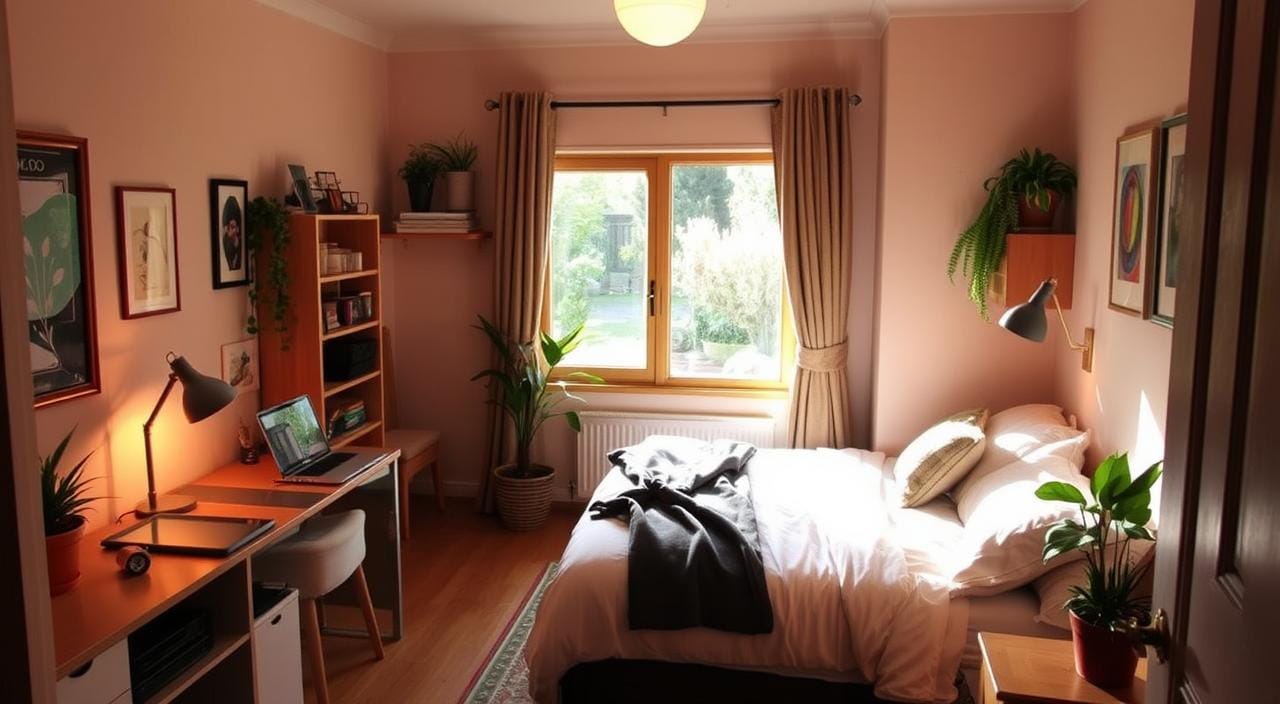How to Rent Out a Room in Your House: Complete Guide
Renting out a room in your house can be an attractive option for homeowners seeking to generate an extra income stream. This comprehensive guide covers the essential steps to successfully rent out a room, including understanding legal requirements, preparing your space, finding tenants, and managing the rental process. By following these steps, homeowners can navigate the complexities of becoming a landlord and maximize the benefits of renting out a room in their house.
Renting out a room can be a great way to make the most out of your home by utilizing unused space and generating extra income through the property you already own. This approach offers flexibility in lease terms, potential tax deductions, and the possibility of future property appreciation if you decide to sell. However, it’s important to consider the potential drawbacks, such as loss of privacy, the effort required to find and manage a renter, and the need for legal and regulatory compliance.
By understanding the key steps and factors involved in renting out a room, homeowners can make an informed decision and navigate the process effectively. This guide will provide you with the necessary information to prepare your space, set competitive rental rates, market your room, screen and manage tenants, and ensure legal and financial compliance.
Understanding Legal Requirements and Insurance
Renting out a room in your house requires understanding the legal landscape and ensuring proper insurance coverage. Landlord-tenant laws cover a range of rights and responsibilities, from handling eviction procedures to maintaining habitable conditions and respecting tenant privacy. As a landlord, you must comply with local regulations that may restrict or dictate the specifics of room rentals, such as minimum room sizes or safety features.
Landlord-Tenant Laws and Rights
Familiarize yourself with the rental laws and regulations in your area. In Florida, for example, residential properties must have at least one habitable room of at least 120 square feet, with additional rooms being at least 70 square feet. Local housing codes may also stipulate specific safety requirements, such as smoke alarms and clear emergency exits. Understanding these legal obligations is crucial for protecting both the landlord and the tenant.
Insurance Coverage and Liability Protection
To minimize risk and ensure financial security, consider obtaining landlord insurance. This coverage is typically 25% more expensive than a standard homeowners policy, as rental properties pose higher risks. Landlord insurance can protect the property and cover lost rental income in case of conflicts or issues with tenants. It’s also important to note that homeowners insurance may not fully cover rental activities, so dwelling property insurance is often necessary, particularly for short-term rentals.
Local Regulations and Restrictions
Closely examine any local regulations or restrictions that may apply to renting out a room in your house. Neighborhood associations, co-op boards, or municipal authorities may have specific rules or guidelines that you need to follow. Familiarizing yourself with these local requirements can help you navigate the process smoothly and avoid potential legal complications.
By understanding the legal requirements and insurance considerations, you can protect yourself, your property, and your tenants, laying the foundation for a successful landlord-tenant relationship.
How Do You Rent Out a Room in Your House: Essential Preparations
Renting out a spare room in your house can be a lucrative way to generate extra income, but it requires careful preparation. Before advertising your rental space, it’s essential to select and prepare the room to ensure a comfortable and appealing living environment for potential tenants.
Selecting and Preparing the Room
Begin by thoroughly cleaning and painting the room, ensuring it’s presentable and ready for occupancy. Check that all electrical outlets are in working order and make any necessary repairs or upgrades. Install locks on the tenant’s room and any off-limit areas to maintain privacy and security. Take an inventory of your personal possessions to avoid any potential disputes down the line.
Setting Competitive Rental Rates
Determining the right rental rate for your spare room is crucial. Research the local market using sites like Craigslist, Zillow, or Trulia to understand the competitive rental rates in your area. Consider factors such as your mortgage payments, insurance premiums, utilities, square footage, and amenities when setting your rate. Finding the right balance between profitability and preparing rental space that is attractive to potential tenants is key.
Creating House Rules and Boundaries
Establishing clear house rules and boundaries is essential for maintaining a harmonious living arrangement. Decide on guidelines for shared spaces, noise levels, guests, and any other expectations. Communicate these rules upfront to ensure a smooth renting experience for both you and your tenant.
By carefully renting out spare room, preparing the rental space, and setting competitive rates, you can create an attractive and well-managed rental opportunity in your home.
Marketing Your Room and Finding Tenants
Renting out a room in your house can be a lucrative venture, but it’s crucial to market your space effectively to attract suitable tenants. Leverage the power of online rental listing sites like Airbnb for short-term rentals, Trulia for long-term renters, and Roomster for quick postings. When creating your Airbnb hosting or short-term rental listing, be mindful of fair housing laws while specifying your preferred tenant characteristics.
Provide detailed information about the room, its amenities, and your house rules. Accompany your listing with high-quality photographs to make it visually appealing. Effective rental listing site marketing strategies can significantly boost your chances of finding the right tenants and increasing occupancy rates.
Remember, the key to successfully renting out a room is to strike a balance between fair and transparent communication with potential tenants, while also protecting your interests as a homeowner. By following these best practices, you can streamline the process of finding reliable and compatible roommates or lodgers.
Screening and Managing Tenants
Screening potential tenants thoroughly is crucial when renting out a room in your house. Utilize rental applications, background checks, and credit checks to assess each applicant’s qualifications. Request copies of identification and obtain authorization for criminal background checks to ensure you have a comprehensive understanding of your prospective tenant’s history.
Creating Rental Agreements
Crafting a detailed room rental agreement is essential for maintaining a positive landlord-tenant relationship and setting clear expectations. This agreement should include the rental terms, monthly rent amount, and specific conditions for living in a shared space. Consider incorporating clauses about cleanliness standards and shared expenses to establish a harmonious living environment.
Setting Up Rent Collection Systems
Establishing a reliable rent collection system is crucial for managing your rental property. Implement clear policies for late payments and outline the consequences for non-payment. Effective tenant screening and management processes are vital for ensuring a smooth rental experience and maintaining a positive relationship with your tenants.
Conclusion
Renting out a room in your house can be a rewarding way to generate an extra income stream and maximize unused space. By understanding the legal requirements, preparing your space properly, marketing effectively, and implementing sound tenant management practices, homeowners can successfully navigate the challenges of becoming a landlord. While it requires careful planning and ongoing effort, home sharing can provide financial benefits and potentially enriching experiences through guest accommodation.
The key to successfully renting out a room lies in thorough preparation and responsible property management. Adhering to state and local regulations, ensuring adequate insurance coverage, and creating detailed house rules can help mitigate risks and foster positive tenant-landlord relationships. By striking the right balance between financial considerations and practical concerns, homeowners can turn their unused space into a profitable and enjoyable venture.
Ultimately, renting out a room in your house can be a rewarding experience, offering the opportunity to supplement your income, foster new connections, and make the most of your living space. With the right approach and a commitment to responsible property management, this endeavor can become a valuable asset in your financial and personal well-being.
FAQ
What legal requirements do I need to consider when renting out a room in my house?
Landlord-tenant laws cover rights and responsibilities, eviction procedures, and security deposit regulations. Landlords must maintain habitable conditions, handle repairs, provide security measures, and respect tenant privacy. It’s crucial to check with your local authorities about any regulations that may restrict room rentals.
What insurance considerations are important when renting out a room?
You should inform your insurance providers about renting out a room and obtain landlord insurance. You may also require your tenants to have renter’s insurance to protect their personal belongings.
How do I prepare the room for renting?
Prepare the room by painting, cleaning, and ensuring all electrical outlets work. Install locks on the tenant’s room and off-limit areas. Take inventory of your personal possessions.
How do I determine the rent for the room?
Research local market rates using sites like Craigslist, Zillow, or Trulia. Consider factors such as mortgage payments, insurance premiums, utilities, square footage, and amenities.
What are some effective ways to market and find tenants for the room?
Utilize various rental listing sites, such as Airbnb for short-term rentals, Trulia for long-term rentals, and Roomster for quick listings. Create a detailed and appealing listing with high-quality photos.
How do I screen potential tenants?
Thoroughly screen potential tenants using rental applications, background checks, and credit checks. Request copies of identification and obtain authorization for criminal background checks. Create a comprehensive room rental agreement that includes rental terms, monthly rent amount, and specific conditions for living in a shared space.





